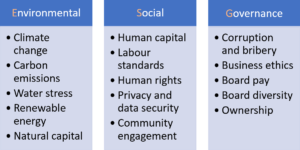By Yui Seeng Cheng - Mileage Communications | August 30 2021
In 2018, teenage Swedish environmental activist Greta Thunberg caused a worldwide sensation by protesting outside the Swedish parliament to raise awareness for climate change activism. Since then, a whole gamut of issues associated with the environment has constantly been in the spotlight.
It’s not just environmental concerns that are becoming increasingly critical, but a more comprehensive range of issues pertinent to human rights. The term ESG — an acronym for Environmental, Social and (Corporate) Governance — has started to gain prominence as a set of standards for a company’s operations that socially conscious investors use to screen potential investments.
Here are some examples of what the ESG criteria entail:

Globally, ESG investing has been experiencing monumental growth, with ESG assets under management jumping from US$22.8 trillion in 2016 to US$30.6 trillion in 2018, and projected to exceed US$53 trillion by 2025.
In contrast to the global scene, Singapore appears to be more conservative when it comes to ESG investing. In an HSBC survey this year, only a quarter of Singapore investors’ investments consider ESG factors, despite 80 per cent of them believing that sustainable, environmental and ethical issues are essential in managing their investments.
This could be attributed to a lack of knowledge on ESG investing — two in three investors in Singapore said they do not want to lose out financially when tackling ESG issues, while 58 per cent noted that although they would like to do more, they do not know how to approach this as an investor.
Almost half of the investors alluded to a lack of sustainable investment products that meet their needs and concerns. About 38 per cent pointed out high costs as a hurdle, while 36 per cent do not want to limit the range of sectors or companies they invest in.
While the uptake rate of ESG factors is still low, there is much potential for Singapore given that the government has made great strides in paving the way for advancement in ESG.
One initiative is the Monetary Authority of Singapore’s (MAS) Green Finance Action Plan introduced in 2019. With the objective of building a more sustainable future, the plan aims to strengthen the financial sector’s resilience, develop markets and solutions, harness technology and build knowledge and capabilities. For instance, MAS launched the S$1.75m Global FinTech Innovation Challenge in 2020 to seek out innovative solutions to help financial institutions respond better to the pandemic and climate change.
The Singapore Government also has plans to issue green bonds worth S$19 billion to pay for public sector infrastructure projects that have a positive environmental impact. One of the projects that will be financed with green bonds is Tuas Nexus, Singapore’s first integrated water and solid waste treatment facility slated for completion in 2025.
Although investors in Singapore have not quite jumped on the ESG bandwagon yet, it is nonetheless crucial to understand what it means when an organisation has met ESG criteria. What will future investors look for?
A survey by IHS Markit shows that some top ESG metrics sought by Private Equity fund investors are:
Evidently, ESG metrics encompass a wide spectrum — from workforce management to the environment and even data management. Companies in Singapore who are looking to increase their market value should keep these metrics in mind and more importantly, be willing to channel resources to the development of ESG initiatives.
With this, organisations in Singapore will be well-equipped to embrace a future where ESG criteria becomes even more valuable to investors.
Privacy Policy | Copyright 2021 Public Relations Global Network